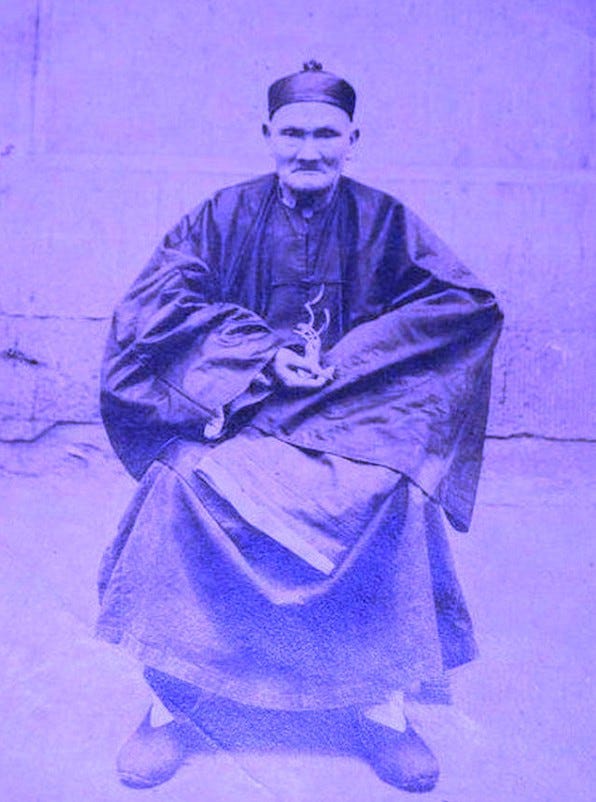The Unique Lifestyle of the “World’s Oldest Man” and His Wisdom for Longevity
Written on
Chapter 1: The Legend of Li Ching-Yeun
Many people might scoff at the idea of someone living for over 250 years. This skepticism is understandable, especially when considering the modern lifestyle filled with pollution and stress. Yet, historical accounts suggest that some individuals thrived in ways we can hardly imagine today, relying on natural resources and a harmonious lifestyle rather than the conveniences we’ve grown accustomed to.
Before the Communist Revolution in China, a remarkable man named Li Ching-Yeun wandered through the mountainous regions, collecting and selling herbs reputed to promote longevity. In 1749, at the age of 72, he was acknowledged in government records for joining the Chinese military, where he served not only as a martial arts instructor but also as a strategic advisor.
His life was well-documented; officials celebrated him on his 150th birthday in 1827, and again in 1877 when he turned 200, as noted in a New York Times article. By the time he reached 250, General Yang Sen of China’s National Revolutionary Army invited him for a visit, capturing a moment in history with a photograph.

The story goes that Li began his journey as an herbalist at the tender age of ten, traversing high mountains in search of life-enhancing herbs. He traveled extensively across China, Tibet, Vietnam, Thailand, and Manchuria, gathering these precious resources throughout his life. Upon reaching the age of 100, he shifted to a sales role, maintaining his connection to the herbs that seemed to sustain his vitality.
Li was also a practitioner of Qigong, an ancient practice that focuses on cultivating life force energy. With the passage of time, records indicate his preferred anti-aging superfoods and herbs, which we will explore next.
Chapter 2: Li's Favorite Herbs for Longevity
Reishi mushrooms, commonly referred to as Lingzhi, were among his top choices. Research indicates that these mushrooms possess anti-cancer qualities, boosting the activity of natural killer cells that help fight infections and cancer while enhancing immune function. Additionally, studies have linked reishi mushrooms to reduced anxiety and improved heart health.
Goji berries, hailed as a superfood, have a long history in China for treating ailments like high blood pressure and age-related issues. They are loaded with antioxidants, promoting wellness and aiding in weight loss and sleep quality.
Another favorite of Li's was wild ginseng, known for its high demand due to its medicinal properties. It is often hard to find in the wild, even in parts of North America, as it has been classified as an endangered species in some areas. Ginseng is praised for its anti-inflammatory effects and potential to enhance cognitive functions.
While He Shou Wu (Chinese knotweed) is traditionally used for age-related issues, it has significant side effects, including liver damage, so caution is advised. On the other hand, Gotu kola, a herb from the parsley family, is known for its benefits in wound healing and circulation, though it's wise to start with low doses to avoid potential side effects.
Interestingly, Li was also said to have consumed rice wine, although specifics regarding his consumption habits remain unclear. Ultimately, Li emphasized that maintaining a calm mind might be the most crucial factor for longevity, even more than the herbs he cherished. His famous advice encapsulates this philosophy: “Keep a quiet heart, sit like a tortoise, walk sprightly like a pigeon, and sleep like a dog.”
These words suggest that emotional balance, comfort, good posture, and restful sleep are vital for a long life. Future discussions in this anti-aging series will delve deeper into the meanings behind this wisdom. Sign up for my emails to stay updated.
If you're curious about the principles of Qigong that Li practiced, consider exploring Club Qigong.
Disclaimer: The information on this page has not been evaluated by the FDA. It should not be taken as medical advice. Always consult a healthcare professional before beginning any new supplement or exercise regime, especially if you have pre-existing conditions or are pregnant. The products mentioned are not intended to diagnose, treat, cure, or prevent any diseases. Joe recommends only those products that he trusts and that have benefitted him personally.